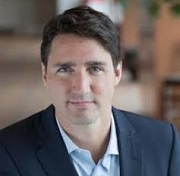Canada’s Prime Minister: Legal Marijuana Is About Health and Safety, Not Money
The new prime minister of Canada, who campaigned on legalizing marijuana, said Thursday that he wants the country to take the time it needs to get the details right and that it’s important for the government make its cannabis policy decisions for the right reasons.
Ending prohibition “was never about a money maker. It was always about public health, public safety,” said Justin Trudeau, who was sworn in as the head of Canada’s federal government last month.
“The big reason we chose to commit to controlling and regulating marijuana is to keep young people safe,” he said in an interview with the Canadian Press.
Setting an optimal tax rate for marijuana will be a crucial decision, Trudeau said. “The fact is that if you tax it too much, as we saw with cigarettes, you end up with driving things towards a black market, which will not keep Canadians safe, particularly young Canadians.”
And the prime minister wants the revenues generated from legal sales to be put into reducing drug abuse.
“There’s a potential for a bit of revenue on that but we’re certainly not looking for a windfall,” he said. “And it is certainly our thought that money that comes in should go towards addiction treatment and mental health support and education programs, rather than financing general revenue.”
Separately, in a press conference, the prime minister said it was important for the federal government to consult with local officials to formulate cannabis policies that work best for their communities.
When it comes to setting the details about where and how marijuana will be sold to consumers, “obviously the provinces, and indeed the municipalities, will have to be an integral part of that discussion,” Trudeau said.
It’s unclear exactly how much latitude the prime minister wants to give localities in setting cannabis industry regulations, but he made it clear that he at least wants their voices to be heard as the federal government moves forward.
“We’re expecting there to be different perspectives and different solutions put forward across the country by various municipalities and provinces,” he said. “The challenge of getting this important initiative right is one of ensuring that we are broadly listening to partners, to folks from the medical marijuana industry to municipal partners to provinces and of course drawing on best practices from around the world.”
Justin Trudeau says he welcomes provincial input on marijuana dispensary strategy #cdnpoli https://t.co/jzcLWuELlz
— Globalnews.ca (@globalnews) December 17, 2015
In both Thursday appearances, Trudeau argued that legalization would protect kids and hurt criminals.
“The move to legalize, to control, to regulate marijuana is based on a concern that it is too easy for our young people to access marijuana right now, that we have the highest rate of underage use of marijuana of any of 29 different developed countries. And that has to stop,” he said.
“We need to make sure we’re keeping our kids safe and keeping our communities safe by removing the black market and the criminal gangs and street organizations from it,” Trudeau said, adding that cannabis regulation will “remove a significant revenue stream” from organized crime.
Health Minister Jane Philpott said last month that the government has already begun the process of examining potential legalization models. Less than two weeks after being sworn in, Trudeau directed her to work with other cabinet ministers to craft a plan to end prohibition. The actions are in accordance with Trudeau’s campaign pledge to move on legalization “right away” if elected.
In the country’s October 19 elections, Trudeau’s Liberal Party won an outright majority of seats in the House of Commons, meaning that the new prime minister should be able to enact a new marijuana policy without much meaningful resistance.
It isn’t publicly known what timetable Trudeau will direct his government to move forward by, or what the process of settling on a legalization model will entail.
“We’re going to get this right in a way that suits Canadians broadly and specifically in their communities, and why we’re taking the time to weigh in properly and ensure that we’re achieving our goals of protecting our young people and removing the criminal profits from marijuana,” Trudeau said.
Green Medicine Trailer
Check out the trailer for Green Medicine: Chile's Medical Cannabis Revolution, a new documentary, produced by Paradise Seeds, which will be released on Youtube on December 15th in Spanish and English subtitle versions.
Director, Diego Estay, and his team of filmmakers followed the progress of Latin America's first legal medical marihuana plantation, from seed to harvest, for 6 months.
From the growers of the Daya Foundation to the scientists investigating medical benefits, politicians arguing for change and the patients whose quality of life depends on this amazing plant, Green Medicine tells their story.
Green Medicine: New Documentary Highlights Chile’s Medical Cannabis Revolution
A new documentary follows the extraordinary journey of the Daya Foundation, a group which made international headlines in 2014 by becoming Latin America’s first legal medical cannabis plantation. Green Medicine: Chile’s Medical Cannabis Revolution had its premiere at Expo Weed in Santiago in November and is released online to...
Research Says Cannabis Affects Intestinal Flora And May Prevent Obesity
Canadian researchers have recently published a study that shows the potential cannabis has for preventing and treating obesity. Mice fed a high-fat diet with daily THC administration gained significantly less weight than those without THC. Cannabis may have some protectiv......
Latest
Coronavirus Strikes Massachusetts Cannabis Company Employees
Reassessing the Essential: Cannabis in the Time of a Pandemic
5 Reasons To Try Aspen Valley CBG Flower (30% Off)
High Times Cannabis Cups Go Virtual In Wake Of Coronavirus Pandemic
Drug Enforcement Administration Proposes Plan To Expand Cannabis Research
Ghana Legalizes Cannabis For Medicinal And Industrial Uses
The cheapest legal weed in Canada: Discover these cannabis ‘value brands’
Cannabis and coronavirus: Here’s what you need to know
cannabis designs
The Best Of
WHO Rules CBD Should Not Be a Scheduled Drug

Dr Cristina Sanchez PhD video interview on medical marijuana and cancer

Biochemist Dennis Hill interview; Cannabis oil as a cure for cancer.

The unofficial World Record holder for cannabis smoking part 1








